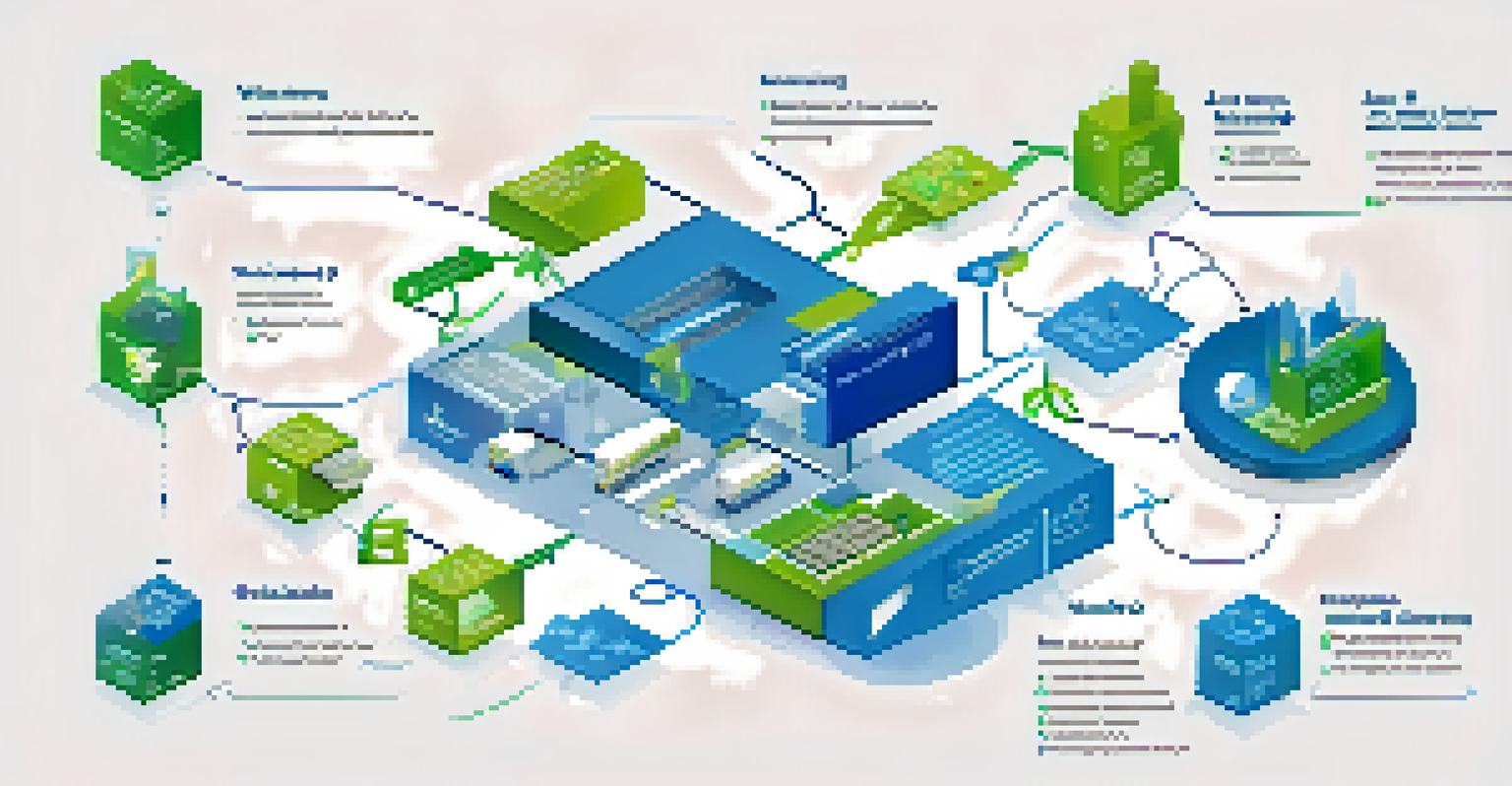The Role of Blockchain in Enhancing Data Integrity

Understanding Blockchain: A Brief Overview
Blockchain is a decentralized digital ledger that records transactions across many computers. This means that once data is entered, it cannot be altered without the consensus of the network. Imagine it as a public library where each book represents a block of information, and all changes must be approved by the entire community.
Blockchain is the tech. Bitcoin is merely the emblem of blockchain technology.
The technology behind blockchain operates through a series of cryptographic techniques, ensuring that data remains secure. This cryptographic security is akin to locking your valuables in a safe; only those with the key can access it. Therefore, blockchain can serve as a reliable method for maintaining data integrity.
As we delve deeper into the topic, it's crucial to understand how this technology is applied in various sectors, enhancing data authenticity and transparency in processes that traditionally lacked these qualities.
How Blockchain Ensures Data Integrity
Data integrity refers to the accuracy and consistency of data over its lifecycle. Blockchain enhances this by ensuring that once a transaction is recorded, it is immutable. Think of it like writing in stone; once it's done, it can't be changed without leaving evidence of tampering.

Each block in the chain contains a unique code called a hash, which links it to the previous block. This connection ensures that any alteration to one block would require changes to all subsequent blocks, making fraud highly detectable. It’s similar to a chain of dominoes—knock one over, and it affects the entire line.
Blockchain Enhances Data Integrity
Blockchain's decentralized and cryptographic nature ensures that once transactions are recorded, they remain accurate and immutable.
By creating a transparent and secure environment, blockchain technology fosters trust among parties involved in transactions, which is particularly valuable in industries such as finance, healthcare, and supply chain management.
Applications of Blockchain in Various Industries
Blockchain is being embraced across various sectors, each leveraging its potential to enhance data integrity. For instance, in healthcare, patient records can be securely shared among professionals while maintaining confidentiality. Imagine a digital vault where only authorized personnel can access sensitive information.
The future of money is digital currency.
In supply chain management, blockchain tracks products from origin to consumer, ensuring authenticity and reducing fraud. It’s like having a detailed map that shows every stop a product makes, which helps verify its journey and legitimacy.
Additionally, the financial sector uses blockchain to facilitate secure transactions and reduce the risk of fraud. By eliminating the need for intermediaries, it not only speeds up processes but also significantly enhances data reliability.
Challenges in Implementing Blockchain Technology
Despite its many advantages, implementing blockchain technology is not without challenges. One significant hurdle is scalability; as more transactions occur, the network can become congested. It’s akin to rush hour traffic where too many cars on the road slow everything down.
Moreover, the energy consumption associated with maintaining blockchain networks, particularly those using Proof of Work, raises environmental concerns. This issue prompts a conversation about sustainability and the need for more energy-efficient consensus mechanisms.
Smart Contracts Automate Processes
Smart contracts facilitate self-executing agreements, reducing the need for intermediaries and enhancing the reliability of transactions.
Lastly, there is a steep learning curve for organizations looking to adopt blockchain. Education and training are essential to help teams understand and utilize this technology effectively.
The Role of Smart Contracts in Data Integrity
Smart contracts are self-executing contracts with the terms of the agreement directly written into code. They operate on the blockchain and facilitate, verify, or enforce the negotiation or performance of a contract. Picture them as digital vending machines that automatically dispense products when the correct conditions are met.
By automating processes, smart contracts eliminate the need for intermediaries, reducing costs and the potential for human error. This automation bolsters data integrity, ensuring that transactions are executed exactly as intended and recorded on the blockchain.
As they evolve, smart contracts are proving to be a game-changer in various sectors, from real estate to insurance, where trust and transparency are paramount.
Future Trends in Blockchain and Data Integrity
The future of blockchain technology looks promising, especially in enhancing data integrity. As more organizations recognize its value, we can expect increased adoption across industries. It's like a snowball effect; the more it rolls, the larger it becomes, gaining momentum and visibility.
Emerging trends, such as the integration of Artificial Intelligence (AI) with blockchain, could further improve data verification processes. AI can analyze vast amounts of data quickly, flagging inconsistencies while blockchain ensures that the data remains unaltered.
Challenges in Blockchain Adoption
Despite its advantages, organizations face challenges like scalability, energy consumption, and a steep learning curve when implementing blockchain technology.
Ultimately, as technology continues to advance, the potential for blockchain to revolutionize how we secure and maintain data integrity is immense, promising a future where trust is built into the infrastructure of our digital interactions.
Conclusion: Embracing Blockchain for Data Integrity
In conclusion, blockchain technology offers a robust solution for enhancing data integrity across various sectors. Its decentralized nature, along with cryptographic security, ensures that once data is recorded, it remains accurate and trustworthy. Just as a well-constructed bridge provides safe passage over turbulent waters, blockchain can navigate the complexities of data management.
While challenges exist in its implementation, the benefits far outweigh the drawbacks. By embracing blockchain, organizations can foster trust, transparency, and security in their data practices, ultimately leading to better decision-making and improved outcomes.

As we move forward, it is essential for businesses to consider how blockchain can be integrated into their operations, ensuring that data integrity becomes a core component of their strategy.